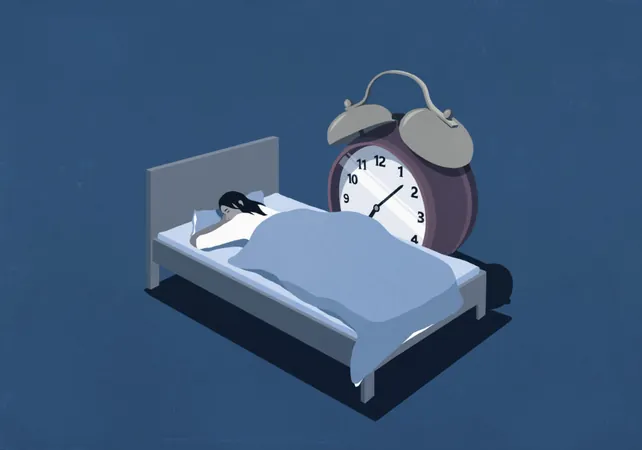
The Secret of Natural Short Sleepers: Can They Unlock the Key to Sleep Efficiency?
2024-12-18
Author: Kai
Introduction
In a fascinating revelation over recent years, scientists have identified a remarkable group of individuals known as "natural short sleepers" — people who thrive on a mere four to six hours of sleep each night without any apparent downsides. Unlike the majority, who struggle with sleep deprivation, these individuals challenge our understanding of what sleep truly is, raising the intriguing question: what are they doing differently?
Historical Perspective on Sleep
Historically, sleep was perceived as a passive state, akin to turning off a computer overnight. Thomas Edison famously deemed sleep a relic from our primitive past, boasting that he slept no more than four hours a night. Recent years, however, have seen an alarming trend in sleep deprivation, especially in the United States, where a notable portion of adults is getting less than five hours nightly.
The Importance of Sleep
Modern research tells a different story; sleep is an intricate, vital process! It plays a crucial role in energy restoration, waste elimination, and memory consolidation. Chronic sleep deprivation can lead to severe health issues ranging from cognitive impairment to chronic illnesses.
The Two-Process Model of Sleep
Among the pioneering work on sleep was the two-process model suggested by Hungarian-Swiss researcher Alexander Borbély in the 1970s. This model explains the pillars of sleep regulation: the circadian rhythm, influenced by external light cues, and sleep homeostasis, a buildup of sleep pressure that grows during wakefulness and dissipates during rest.
Natural Short Sleepers: A Case Study
Most people, however, fall somewhere in between the extremes of short and long sleepers. Most of the recently recognized natural short sleepers emerged after neurologist Louis Ptáček and geneticist Ying-Hui Fu became involved in a case study of an unusual family — one that exhibited unique sleep patterns of needing less slumber yet not adhering to an early bedtime.
Genetic Factors at Play
The pair uncovered that this phenomenon was linked to a mutation in the DEC2 gene, which helps regulate the body’s sleep-wake cycle. Further studies on engineered mice showed that those with this genetic alteration slept significantly less while remaining healthy, indicating that some people possess a unique genetic trait allowing them to optimize sleep efficiency.
Further Genetic Insights
Research now suggests that these individuals possess several gene mutations linked to their unique sleeping habits, including ADRB1 and NPSR1, which participate in controlling sleep duration and quality. Notably, it's been observed that natural short sleepers often exhibit traits such as heightened ambition, resilience to stress, and even potentially longer life spans.
Caution Against Skimping on Sleep
But does this mean everyone should start skimping on sleep? Absolutely not! Experts like Phyllis Zee emphasize the importance of sleep efficiency, not merely duration. It’s conceivable that natural short sleepers attain more restorative deep sleep phases, helping them remain productive and energetic despite limited hours.
Exploring Neurodegenerative Processes
Moreover, researchers are now exploring the potential benefits of efficient sleep cycles — studies reveal that those with short sleep genes might better manage neurodegenerative processes, potentially preventing or delaying conditions like Alzheimer’s disease.
The Future of Sleep Research
Looking ahead, this newfound understanding could provide invaluable insights into the broader sleep landscape. As researchers strive to unravel the molecular mysteries of sleep — by investigating the nuances of sleep waves and brain activity during rest — there’s hope that interventions could help many achieve optimal sleeping conditions tailored to individual needs.
Conclusion
In a world where sleep is often sacrificed for productivity, understanding the genetic and environmental influences on sleep can lead to better health outcomes. Everyone has unique sleep requirements, and instead of trying to conform to the conventional eight-hour benchmark, individuals should listen to their bodies and recognize that sleep is not a one-size-fits-all affair.
Stay tuned for potential breakthroughs that may change the way we perceive sleep forever! Could we unlock the secrets of short sleepers to enhance productivity and well-being universally? The research is only beginning!




 Brasil (PT)
Brasil (PT)
 Canada (EN)
Canada (EN)
 Chile (ES)
Chile (ES)
 España (ES)
España (ES)
 France (FR)
France (FR)
 Hong Kong (EN)
Hong Kong (EN)
 Italia (IT)
Italia (IT)
 日本 (JA)
日本 (JA)
 Magyarország (HU)
Magyarország (HU)
 Norge (NO)
Norge (NO)
 Polska (PL)
Polska (PL)
 Schweiz (DE)
Schweiz (DE)
 Singapore (EN)
Singapore (EN)
 Sverige (SV)
Sverige (SV)
 Suomi (FI)
Suomi (FI)
 Türkiye (TR)
Türkiye (TR)